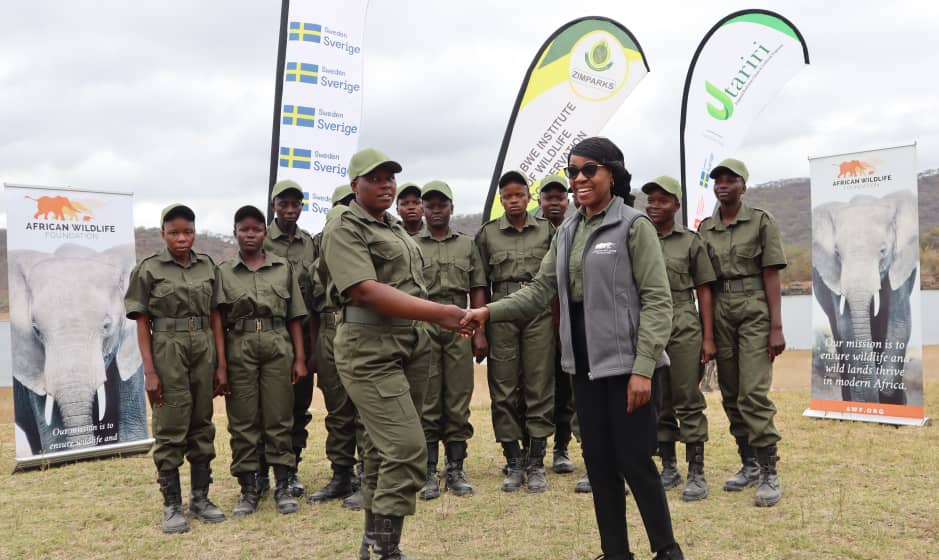
By staff writer
Young women have lately been rising to the occasion and taking up space in wildlife conservation, indicating a narrowing gender and age gap in the previously male dominated sector.
This comes after a total of 28 community wildlife scouts drawn from Mbire and Muzarabani districts graduated at the Zimbabwe Institute of Wildlife Conservation (ZIWC) in Masvingo, almost half of whom were women.
The scouts had completed a basic ranger training course facilitated by the African Wildlife Foundation (AWF) under the ongoing Swedish International Development Agency (SIDA) funded ‘UTARIRI – Integrated and Adaptive Biodiversity, Climate and Livelihoods Project in the Zambezi Valley, 2022-2025.’
The project focuses on contributing towards sustainable management and utilization of natural resources, restoration of biodiversity, climate action, and building community resilience in the Zambezi Valley.
It’s outcomes are centered around increased community stewardship and sustainable utilization of natural resources focusing on pro-poor and gender-sensitive value chains, ecological restoration, and protection of wildlife habitats through broad-based biodiversity actions, enhanced participation of women and youths in livelihoods and resilience-building efforts as well as increased gender-sensitive public, private participation in sustainable biodiversity management, climate, and research.
Women have always been known to play a critical role in sustaining communities and managing natural resources, but their contributions have often been undervalued and neglected.
Speaking at the graduation, Professor Never Muboko, who is the Principal for Zimbabwe Institute of Wildlife Conservation put emphasis on the need to empower the girl child in wildlife conservation.
“Witnessing such a great number of women graduating today shows gender balance in upskilling and training. I continue to advocate for the improvement of the girl child in wildlife conservation and I am happy today with the ratio that we have,”
Professor Muboko
One of the young female graduates, Missy Muchadei (19) who was also the overall best student, expressed her heartfelt gratitude to all the stakeholders who supported the basic ranger training.
“We would like to send a sincere thank you to our respective Rural District Councils, Muzarabani RDC, and Mbire RDC through the support of AWF for providing us with the necessary resources and funding to excel in our chosen field,” Missy said.
The basic ranger training course, which took place from June 20, 2023, to July 21, 2023, included both theory and practical training modules, equipping community scouts with skills in ecological monitoring, ranger-based data collection, conducting problem animal management, communicating with stakeholders in wildlife-rich areas, as well as engaging the local community on conservation aspects using human rights-based approaches. With funding support from the SIDA under the Utariri Project, AWF also equipped these scouts with uniforms, including patrol boots critical for their work during anti-poaching patrols.
Additionally, AWF supported a two-week refresher ranger training course offered to another 15 scouts from Mbire and Muzarabani Districts under the Utariri Project, bringing the total number of scouts trained by AWF to over 40 individuals. The refresher training equipped community scouts with skills for planning anti-poaching patrols effectively, interpreting and applying wildlife protection laws in line with the Parks and Wildlife Act, taking the lead in community conservation projects, and applying ecological monitoring techniques for wildlife.
AWF Zimbabwe Country Director Olivia Mufute commended the work being done to improve wildlife conservation in grassroot communities.
“This historic development has come as part of efforts to support community-level human-wildlife conflict management structures under the Utariri Project; this is in harmony with the AWF’s 10-year conservation strategy as we strive to conserve wildlife and reduce poaching and trafficking as major causes of the decline of key wildlife species in Zimbabwe,” Mufute said at the Mbireand Muzarabani RDC scouts’ pass out parade.
“This would not have happened without the unwavering support from the Zim-babwe Parks and Wildlife Management Authority (Zimparks). The strong partnership that we have is indeed yielding positive results on the ground, including the upskilling of scouts that we have witnessed today,” she added.